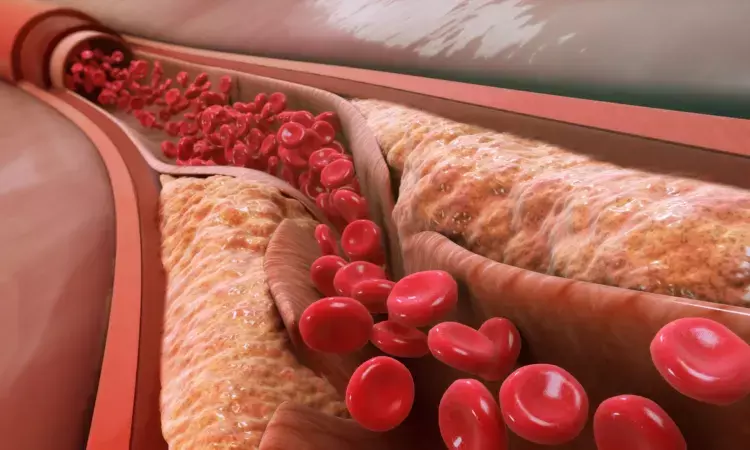- Home
- Medical news & Guidelines
- Anesthesiology
- Cardiology and CTVS
- Critical Care
- Dentistry
- Dermatology
- Diabetes and Endocrinology
- ENT
- Gastroenterology
- Medicine
- Nephrology
- Neurology
- Obstretics-Gynaecology
- Oncology
- Ophthalmology
- Orthopaedics
- Pediatrics-Neonatology
- Psychiatry
- Pulmonology
- Radiology
- Surgery
- Urology
- Laboratory Medicine
- Diet
- Nursing
- Paramedical
- Physiotherapy
- Health news
- Fact Check
- Bone Health Fact Check
- Brain Health Fact Check
- Cancer Related Fact Check
- Child Care Fact Check
- Dental and oral health fact check
- Diabetes and metabolic health fact check
- Diet and Nutrition Fact Check
- Eye and ENT Care Fact Check
- Fitness fact check
- Gut health fact check
- Heart health fact check
- Kidney health fact check
- Medical education fact check
- Men's health fact check
- Respiratory fact check
- Skin and hair care fact check
- Vaccine and Immunization fact check
- Women's health fact check
- AYUSH
- State News
- Andaman and Nicobar Islands
- Andhra Pradesh
- Arunachal Pradesh
- Assam
- Bihar
- Chandigarh
- Chattisgarh
- Dadra and Nagar Haveli
- Daman and Diu
- Delhi
- Goa
- Gujarat
- Haryana
- Himachal Pradesh
- Jammu & Kashmir
- Jharkhand
- Karnataka
- Kerala
- Ladakh
- Lakshadweep
- Madhya Pradesh
- Maharashtra
- Manipur
- Meghalaya
- Mizoram
- Nagaland
- Odisha
- Puducherry
- Punjab
- Rajasthan
- Sikkim
- Tamil Nadu
- Telangana
- Tripura
- Uttar Pradesh
- Uttrakhand
- West Bengal
- Medical Education
- Industry
Obicetrapib addition to statins and ezetimibe safe and effective for LDL-C reduction and ASCVD prevention

USA: Obicetrapib could be used safely in high-intensity statin and ezetimibe in patients with elevated LDL-C (low-density lipoprotein-cholesterol), results from the phase 2 ROSE2 study have revealed.
The researchers reported, "obicetrapib, a Lazarus-like cholesteryl ester transfer protein (CETP) inhibitor, when used in combination with these other medications, about 88% of patients lowered their LDL-cholesterol levels to less than 55 mg/dL."
The study, published in the Journal of Clinical Lipidology, showed that Obicetrapib plus ezetimibe on top of high-intensity statin lowered LDL-cholesterol by 63%. Obicetrapib monotherapy and with ezetimibe are both well-tolerated and safe.
Obicetrapib is an oral CETP inhibitor currently in clinical development for reducing cardiovascular risk and treating hypercholesterolemia. Early studies of obicetrapib have reported it to reduce LDL-C by up to 50% and be well tolerated when administered as monotherapy in combination with moderate- and high-intensity statins.
Christie M. Ballantyne, Department of Medicine, Baylor College of Medicine, Houston, Texas, United States, and colleagues aimed to evaluate the lipid efficacy and safety of the combination of obicetrapib and ezetimibe in patients whose LDL-C was suboptimally controlled despite using high-intensity statins.
The double-masked, randomized, phase 2 trial included patients with DL-C >70 mg/dL and triglycerides (TG) <400 mg/dL on a stable high-intensity statin. They were administered 10 mg obicetrapib plus 10 mg ezetimibe (n = 40), 10 mg obicetrapib (n = 39), or placebo (n = 40) for 12 weeks. Endpoints include lipids, lipoprotein particles, apolipoprotein, safety, tolerability, and PCSK9 (proprotein convertase subtilisin kexin type 9).
The primary analysis included ninety-seven patients (mean age 62.6 years, 63.9% male, average body mass index of 30.9 kg/m2).
The authors reported the following findings:
- LDL-C decreased from baseline to week 12 by 63.4%, 43.5%, and 6.35% in combination, monotherapy, and placebo groups, respectively.
- LDL-C levels of <100, <70, and <55 mg/dL were achieved by 100%, 93.5%, and 87.1% of patients taking the combination.
- Both active treatments significantly reduced non-HDL-C concentrations, apolipoprotein B, and total and small LDL particles.
- Obicetrapib was well tolerated, and no safety issues were identified.
"Our study showed obicetrapib's efficacy in combination with ezetimibe as an adjunct to high-intensity statin for causing robust reductions in non-HDL-C, LDL-C, Apo B, and total and small LDL particle concentrations, while increasing HDL-C compared with high-intensity statin monotherapy," the researchers wrote.
"Our findings support the development of a fixed-dose combination of obicetrapib plus ezetimibe," they wrote.
Additionally, the authors show the obicetrapib potential to be the first CETP inhibitor to advance to clinical practice and fill the treatment gap for patients unable to achieve adequate reductions in LDL cholesterol with other available lipid-lowering medications.
Reference:
Ballantyne CM, Ditmarsch M, Kastelein JJ, Nelson AJ, Kling D, Hsieh A, Curcio DL, Maki KC, Davidson MH, Nicholls SJ. Obicetrapib plus ezetimibe as an adjunct to high-intensity statin therapy: A randomized phase 2 trial. J Clin Lipidol. 2023 May 31:S1933-2874(23)00186-1. doi: 10.1016/j.jacl.2023.05.098. Epub ahead of print. PMID: 37277261.
Dr Kamal Kant Kohli-MBBS, DTCD- a chest specialist with more than 30 years of practice and a flair for writing clinical articles, Dr Kamal Kant Kohli joined Medical Dialogues as a Chief Editor of Medical News. Besides writing articles, as an editor, he proofreads and verifies all the medical content published on Medical Dialogues including those coming from journals, studies,medical conferences,guidelines etc. Email: drkohli@medicaldialogues.in. Contact no. 011-43720751


